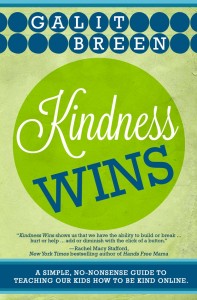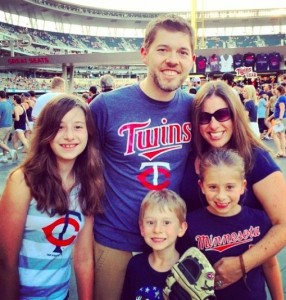 When Galit Breen wrote an article on happy marriages for The Huffington Post last year, the last thing she expected to see was snarky responses about her wedding photo. More specifically, the size of her body in her wedding photo. Galit had been fat-shamed.
When Galit Breen wrote an article on happy marriages for The Huffington Post last year, the last thing she expected to see was snarky responses about her wedding photo. More specifically, the size of her body in her wedding photo. Galit had been fat-shamed.
The follow-up piece about the incident that Galit wrote for xoJane moved me to tears. She expressed how she had allowed herself to be vulnerable in the HuffPo piece–something that all of us writers, all of us women, all of us–struggle with in our bid to be courageous mothers and partners and agents of change, and for that, she was rewarded with cruelty. Her story struck a nerve, and she quickly found herself speaking about the issue on the Today show and Inside Edition.
Around the same time, one of Galit’s daughters asked if she could start posting on social media. Galit thought about the implications, and that’s when she knew she’d been presented with an opportunity to make something good out of her cyberbullying ordeal. That “something good” is Kindness Wins, a book for adults on teaching kids to be kind online.

My relationship with Galit goes back to 2012, when we both had essays published in the breast-cancer-fundraiser Write for the Fight. Now, just days ahead of her new book’s publication, Galit has graciously stopped by to answer a couple of questions I posed about the topic of cyberbullying.
Me: I love that you’re being proactive in helping parents coach their kids on how to be good Internet citizens. What can we do to teach the adults who don’t get it? The trolls and meanies and sometimes downright cruel people?
Galit: This question is so, so important! As we’re trying to create a culture of kindness, this includes our kids and ourselves. Each section of the book contains a guide for how to talk to our kids about maneuvering online kindly and a section for how to discuss the same topic with our peers. This can feel tricky and daunting! But we ask an awful lot of our kids in standing up to things they see or hear that don’t feel right to them, I’m (gently) suggesting we ask the same of ourselves.
For example, when I was studying to be a teacher I had a mentor who told our class to always approach kids who are having a hard time with the assumption that they just don’t know how to do something, rather than thinking that they’re purposefully being difficult. I think this works here, too. We can approach adults who are being unkind online as if they didn’t know that what they’re doing is wrong. This gives us the freedom to speak up and still be kind with our word choices and, if we choose to do so in a comment thread, then others who are reading are also given the permission to stand up, too. It changes the conversation.
Me: What do you think it will take for “the cyberbullying talk” to become as engrained in our society’s parental handbook as “the menstrual cycle talk” and “the birds and the bees talk?” Or is it already well on its way?
Galit: I love this question so much because it’s so spot on. The more open, and diligent, we are in bringing up the topic of how necessary this conversation is for our kids–and as you pointed out, for ourselves–the more “normal” and everyday it will become. Right now, this responsibility falls on those of us who already use social media regularly because we already see the impact that both online kindness and cruelty can have. Our job is to make sure those we love get the benefit of what we’ve learned. The more we share with each other, the better. When a seasoned mom tells a new mom how she got her baby to sleep, eat, or learn how to write her name, she’s helping. This is the exact same thing. The more we talk about it the more normal, and expected, it will become.
The second half of this is joining our kids on social media. I discuss in Kindness Wins what a big advocate I am of being online with our kids and watching out not just for them, but for our friend’s kids as well. This terrain is too big to go at alone. But when we agree to look out for all of our kids, we all benefit and we further normalize the important conversations around cyberbullying and online kindness.
 I’ll draw for a giveaway copy of Kindness Wins on Apr.3
I’ll draw for a giveaway copy of Kindness Wins on Apr.3
Keep this important discussion going: Add a comment below and you’ll be entered to win a digital copy of Galit’s new book (and I hope you’ll leave a review on Amazon once you’ve read it!). As a bonus for my readers who enter but don’t win, Galit’s publisher is offering a free Lemons to Lemonade Party and Book Discussion Guide if they purchase Kindness Wins! The book is available here, and I’ll contact you after the giveaway ends with the details on how to redeem your bonus.
Update: The winner of the book is Marie Ann Bailey. Congrats, Marie Ann!
About the book: Approximately four out of ten kids (42 percent) have experienced cyberbullying. Kindness Wins covers ten habits to directly teach kids as they’re learning how to be kind online. Each section is written in Breen’s trademark parent-to-parent-over-coffee style and concludes with resources for further reading, discussion starters, and bulleted takeaways. She concludes the book with two contracts―one to share with peers and one to share with kids. Just like we needed to teach our children how to walk, swim, and throw a ball, we need to teach them how to maneuver kindly online. This book will help you do just that.
 About Galit: Galit Breen was a classroom and reading teacher for ten years. She has a master’s degree in education and a bachelor’s degree in human development. In 2009, she launched a career as a freelance writer and since then, her work has been featured in various online magazines including Brain, Child, The Huffington Post, TIME, and xoJane. Breen lives in Minnesota with her husband, three children, and a ridiculously spoiled miniature golden doodle. You can learn more about Galit by visiting her blog These Little Waves, Facebook, Pinterest and Twitter.
About Galit: Galit Breen was a classroom and reading teacher for ten years. She has a master’s degree in education and a bachelor’s degree in human development. In 2009, she launched a career as a freelance writer and since then, her work has been featured in various online magazines including Brain, Child, The Huffington Post, TIME, and xoJane. Breen lives in Minnesota with her husband, three children, and a ridiculously spoiled miniature golden doodle. You can learn more about Galit by visiting her blog These Little Waves, Facebook, Pinterest and Twitter.
This is such an important topic. We’ve all read the stories about the terrible toll online bullying can take on kids, and I think many, many parents struggle to figure out how to raise kind, compassionate internet citizens. I love the idea of mums and dads passing on their interwebby wisdom and learning to newer parents in the same way we share our experiences with talking to our children about important life skills.
Galit’s experience with fat-shaming commenters brings to mind a similar situation here in British Columbia where Kristi Gordon, a popular meteorologist on Global News, has received vicious hate mail about her pregnant body. She’s responded to it on air saying that she usually has a thick skin, but she admits the comments had an impact.
Let’s hope Galit’s book helps parents shape a kinder, more curious, more respectful generation of internet citizens.
Hi Kern! It’s so nice to “meet” you! I love the way you honed in on the fact that there’s definitely a way (and a need) for us to pass along what we know from parent-to-parent. It’s so very important and the only way, right?
We’re all in this together, really, right?
And Kern, that breaks my heart that Kristi Gordon is getting harangued about her *pregnant* body. Seriously?
Oh Laura, thank you so much for hosting me here this week! I’m so grateful to share your space and for this beautiful intro and set up!
I have to admit that my favorite part is the way you wove in how we met! And look at us now, still connected and supportive of each other! That right there shows the goodness that the internet has the potential to be!
Thank you again for all of the above! (*Truly)
I’m so glad to host you, Galit. Your story is so significant and telling of what is going on (when the Internet isn’t being all goodness), and I think this book is much needed and timely and important — and I don’t even have kids!
Oh, how the time has flown, hey? I might have even underestimated. I think I’ve known you since 2011! xox
Laura and Galit, thank you for such a great post! I do worry about my grandniece and grandnephews as they start to venture into social media. I worry about them becoming victims of cyberbullying but also of being bullies themselves. Children don’t always understand how deep words can cut and how far-reaching the effects can be. And given that for many of them, their parents aren’t always as “savvy” with social media as the kids. They (the parents) need the help you offer.
Right, Marie, I also love that Galit didn’t make any assumptions and leave the parents out of the education process, even tailoring some of it directly to them. And geez, I can’t even imagine what it must be like to be a kid in this digital age — the pressure! And good kids can totally be drawn into being bullies, unconsciously, or because it’s so important to be cool and be accepted when you’re a kid — that part I can imagine, because I remember it well!
Marie and Laura, you’re both so spot on here. Sometimes bullying is intentional and other times it’s not–it’s kids making mistakes and not realizing /understanding their impact, as you so perfectly said Marie. We have to help each other here–it’s too much and too big to go at alone. I feel good, safe if you will, knowing there are so many like-minded people like the t of you to partner with!
I just shared this article on my social media because it’s such an important issue and Breen’s approach is a kind way to address a cruel problem. Thank you, Laura, for letting your readers know about her book. Thank you, Galit, for writing it.
And thank you for sharing it, Jagoda. It’s appreciated!
Jagoda, thank you so much for that! “A kind way to address a cruel problem” might be my new favorite phrase! LOVE that so much! It’s lovely to meet you, I’m so happy to connect with you!
Just shared.
Galit, you are a role model with a heart the size of Texas, darling. xxx Love from Duluth.
That she is, Kim! Thanks for stopping by.
Great post Laura and Galit! The advice that people are often difficult because they don’t know how to do something or they don’t know that it is wrong is spot on. I lived by that advice in the classroom and know very well I get really difficult at times when I don’t know how to do something. The more schools can to incorporate digital literacy skills into the curriculum the more attention that will be drawn to cyber-bullying.
Thanks, Jeri! When something (especially in the digital realm) becomes easy, it’s also easy to forget that it may not be so obvious to another.
This is very important topic, and we need to stay on top of it as social media is changing so rapidly. It seems that more younger kids are online and have FB pages and know what a tweet is! I have two children, and I feel pulled between being the protective mom and not letting them text with friends, versus being the “cool” mom and letting them do everything their friends are doing. Parents have a really tough job in this regard, because there is no past reference, nothing to look back on and use as a learning tool. Thank you so much for a wonderful post.
Hi Kate, thank you for reading! It is a totally tough spot, and you will probably feel that pull until your kids have moved out of the house, hey?